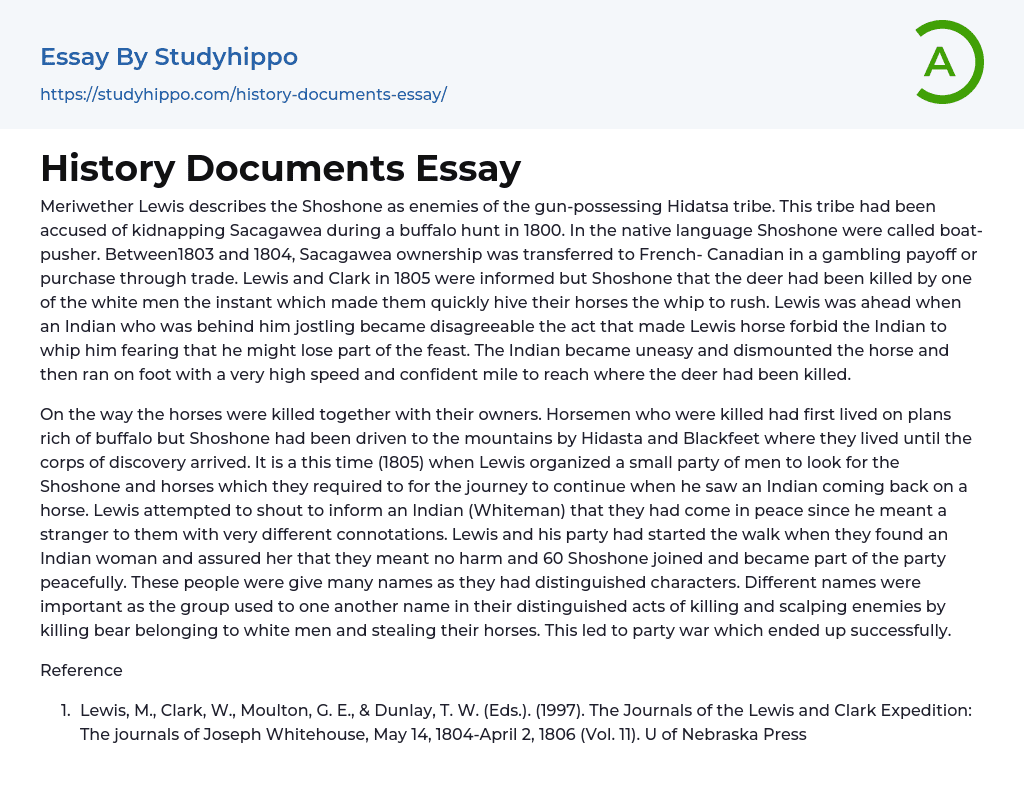Meriwether Lewis describes the Shoshone as enemies of the gun-possessing Hidatsa tribe. This tribe had been accused of kidnapping Sacagawea during a buffalo hunt in 1800. In the native language Shoshone were called boat-pusher. Between1803 and 1804, Sacagawea ownership was transferred to French- Canadian in a gambling payoff or purchase through trade. Lewis and Clark in 1805 were informed but Shoshone that the deer had been killed by one of the white men the instant which made them quickly hive their horses the whip to rush.
Lewis was ahead when an Indian who was behind him jostling became disagreeable the act that made Lewis horse forbid the Indian to whip him fearing that he might lose part of the feast. The Indian became uneasy and dismounted the horse and then ran on f
...oot with a very high speed and confident mile to reach where the deer had been killed. On the way the horses were killed together with their owners. Horsemen who were killed had first lived on plans rich of buffalo but Shoshone had been driven to the mountains by Hidasta and Blackfeet where they lived until the corps of discovery arrived. It is a this time (1805) when Lewis organized a small party of men to look for the Shoshone and horses which they required to for the journey to continue when he saw an Indian coming back on a horse.
Lewis attempted to shout to inform an Indian (Whiteman) that they had come in peace since he meant a stranger to them with very different connotations. Lewis and his party had started the walk when they found an Indian woman and assured her that
they meant no harm and 60 Shoshone joined and became part of the party peacefully. These people were give many names as they had distinguished characters. Different names were important as the group used to one another name in their distinguished acts of killing and scalping enemies by killing bear belonging to white men and stealing their horses.
This led to party war which ended up successfully.
Reference
- Lewis, M., Clark, W., Moulton, G. E., & Dunlay, T. W. (Eds.). (1997). The Journals of the Lewis and Clark Expedition: The journals of Joseph Whitehouse, May 14, 1804-April 2, 1806 (Vol. 11). U of Nebraska Press
- 1920S essays
- 1950S essays
- 1960S essays
- 19Th Century essays
- 20Th Century essays
- Ancient Greece essays
- Bravery essays
- British Empire essays
- Civilization essays
- Colonialism essays
- Declaration of Independence essays
- Evidence essays
- Genocide essays
- Gilded Age essays
- Historical Figures essays
- Historiography essays
- History of the United States essays
- Letter from Birmingham Jail essays
- Louisiana Purchase essays
- Nazi Germany essays
- Rebellion essays
- Revolution essays
- Roman Empire essays
- Russian Empire essays
- The Columbian Exchange essays
- Vikings essays
- War essays
- What is History essays
- World History essays
- World Hunger essays




